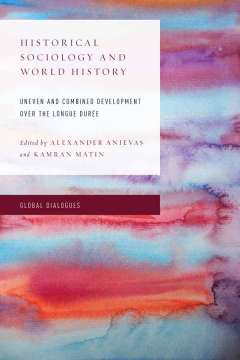
Additional Information
Book Details
Abstract
The concept of 'uneven and combined development' was originally coined by Leon Trotsky to theorise Tsarist Russia's distinctive experience of modernity and revolution. But it has re-emerged over the last decade or so as a burgeoning research programme within International Relations (IR) and historical sociology. It has been critically and creatively deployed in two main areas: the provision of a sociological foundation to international theory overcoming the chronic schism between ‘sociological’ and ‘geopolitical’ modes of enquiry; and, relatedly, in superseding prevailing Eurocentric approaches in the social sciences.
This volume is the first to provide a sustained reflection on the idea of uneven and combined development as the intellectual basis for a non-Eurocentric social theory of ‘the international’. It does so through a series of empirically rich and theoretically informed analyses of socio-historical change, political transformation, and intersocietal conflict over the longue durée. The volume thereby aims to demonstrate the unique potentials of uneven and combined development in overcoming IR and historical sociology’s shared inability to theorize the interactive and multilinear character of development.
In recent years, a growing number of international relations scholars have used the idea of uneven and combined development to fashion social theories of “the international.” First proposed by the Russian Marxist revolutionary Leon Trotsky to describe the trajectory of the Russian Revolution, uneven and combined development as a theoretical framework has been employed to avoid Eurocentrism and highlight cross-society interactions. Anievas (Univ. of Connecticut) and Matin (Sussex Univ., UK) have assembled an impressive array of experts to extend such an idea to historical sociology. Aside from the charge of marginalizing non-European societies, mainstream historical sociology has mostly focused on single nation-states. Uneven and combined development, on the contrary, provides a pluralist perspective on the development of global capitalism over the long term. This edited volume is rich in empirical case studies, ranging from the Ottoman Empire to the Opium War, with no shortage of insights on the different paths of capital accumulation and market integration. While uneven and combined development may not achieve the status of a theoretical paradigm, this insightful book certainly fulfills its goals in bringing extra-European societies into the discussion of world history and in bridging the fields of historical sociology and world history. Summing Up: Highly recommended. Faculty.
Alexander Anievas and Kamran Matin’s edited volume is a formidable compendium of cutting edge scholarship by leading historical sociologists and world historians, radically rethinking their respective fields far beyond their inherited and still dominant Eurocentric gaze. What they achieve is not just a massive contribution to their disciplinary fields, but far more importantly the recasting of world history in a manner that for the first time invests “the world” with seriously grounded significance. With this volume their central and guiding idea of “uneven and combined development” becomes definitive to any serious generation of scholarship to follow.
Hamid Dabashi, Professor of Iranian Studies and Comparative Literature, Columbia University
Anievas and Matin have assembled a creative and compelling discussion for an alterrnative to Eurocentric world history and historical sociology. Ranging from the Paleolithic to late capitalism, and incorporating a rich geographical diversity, the conrtibutors offer an important relational and global contribution to the much-needed rebirth of historical sociology.
Jason W. Moore, Assistant Professor, Fernand Braudel Center, Binghamton University, author of Capitalism in the Web of Life
Alexander Anievas is an Early Career Leverhulme Fellow at the Department of Politics and International Studies, University of Cambridge where he also obtained his PhD. He has published in various journals including European Journal of International Relations, Politics, Review of International Studies, International Politics and Capital & Class. He is the author of Capital, the State, and War: Class Conflict and Geopolitics in the Thirty Years’ Crisis, 1914-1945 (2014) and co-author of How the West Came to Rule: The Geopolitical Origins of Capitalism (2015). He has also edited, co-edited and contributed to Marxism and World Politics (2010), Race and Racism in International Relations ( 2014), Cataclysm 1914: The First World War and the Making of Modern World Politics (2014), and The Longue Durée of the Far Right (2014). He is a member of the editorial collective Historical Materialism: Research in Critical Marxist Theory.
Kamran Matin is Senior Lecturer in International Relations at Sussex University, a management committee member of Centre for Advanced International Theory, and a co-founder and co-director of Sussex Uneven and Combined Development Working Group. His publications on historical sociology and premodern state-formation, postcolonial theory, political Islam, and modern Iranian history have appeared in European Journal of International Relations, Journal of international Relations and Development, and Middle East Critique. He is the author of Recasting Iranian Modernity: International Relations and Social Change (2013).
This exciting book seeks to renew, refresh and critically defend historical sociology in light of a host of challenges to the premises that underlie the classical traditions of social and political thought. The chapters form a wide-ranging conversation that will be edifying to all historians and theorists of international relations.
Robbie Shilliam, Queen Mary University of London, Reader in International Relations
Debates on uneven and combined development within historical sociology have portrayed, for far too long, the “periphery” of non-Europe as a passive recipient of diffusions from a European “core”. This book is a standout success in “deprovincialising” historical sociology to finally address the problems of tunnel vision, diffusionism, and the straightjacket of Eurocentrism.
Adam David Morton, Professor of Political Economy, University of Sydney
Table of Contents
| Section Title | Page | Action | Price |
|---|---|---|---|
| _ENREF_31 | 258 | ||
| _ENREF_335 | 269 | ||
| _ENREF_339 | 269 | ||
| _ENREF_392 | 271 | ||
| _ENREF_555 | 274 | ||
| _ENREF_580 | 275 | ||
| _GoBack | 291 |
